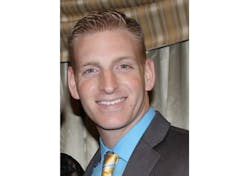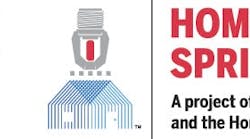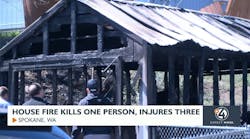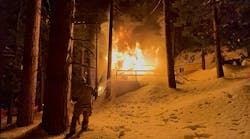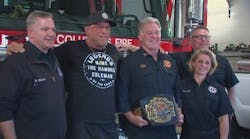On a cold January morning, we were dispatched for a report of an unconscious male, not breathing, with CPR in progress. My crew of three, including myself, arrived on location alongside the BLS unit and immediately began to gather the necessary equipment. It wasn’t until we approached the front door that we were met with screams, barking dogs and an odor that knocked this city boy right in his mouth.
Once the care was initiated by the extremely capable and confident crew, I took a step back to gather some situational awareness and start to anticipate the crew members’ next moves, as I did as the company officer countless times before. It was at that time that I realized that the male patient’s dogs were in their respective cages in the living room. Channeling my inner detective, I located the source of the odor: The dogs were covered in their own feces from all of the excitement that had descended on their house.
We further assisted the medical personnel with patient packaging and movement to the awaiting ambulance and saw them and the patient off to the receiving facility.
As the dust quickly settled, the police officers who were on scene departed with the patient’s girlfriend, looking to us to lock up the house before we departed, which was a task that we were more than able to perform.
At that moment, I gathered with my crew, disheveled and exhausted from their Herculean efforts to revive the man. We each looked at the dogs in their present state, silently glanced at each other and, with the most wholesome of nonverbal cues, immediately knew what the right thing to do was.
We easily located cleaning supplies (readily available on the kitchen counter) and got to work right away. While I choked back the desire to add last night’s dinner to the cleanup efforts, my stoic chauffeur and the person on the crew who works the nozzle diligently removed from the home any sign that the event occurred. I took the Great Dane puppy into the backyard. I located a hose and rinsed him off. EMS towels made quick work of drying him and getting him back into the warm confines of his dog crate.
A silent nod, a sense of goodwill and locking of the front door was how we departed.
On arrival at the station, I thanked the members for being so like-minded and so committed to the cause of truly taking care of people. Their efforts reaffirmed my desire to empower our staff to explore the above and beyond.
The right thing to do
Fast forward a few months later: Through some networking and discovery, the girlfriend of the unfortunately now-deceased male patient reached out to me. She submitted a letter of thanks to the crew for their “profound kindness” and for providing a bright spot to one of the worst days of her life.
It was at that moment that unreasonable hospitality came into my life.
“Unreasonable Hospitality: The Remarkable Power of Giving People More than They Expect,” by Will Guidara (2022, Optimism Press) chronicles the author’s journey from hospitality management student to having a four-star Michelin-rated restaurant that was voted No. 1 in the world in 2017.
It wasn’t the first nor the second time that I read the book that I was able to truly discern what the correlation between the hospitality industry and the emergency services is. They both are, after all, service-oriented industries, with the common medium of most valuable asset: people. That cold January morning, I bore witness to these two stalwarts embracing what to them just felt like “the right thing to do,” when, in fact, it was a visionary representation of what many of us have been living our entire career.
My journey in life has afforded me some extremely humbling events—the marriage to my soulmate, the birth of my children, combat overseas, triumph and tragedy—quite literally, life and death. These events have given me a perspective that’s borne from the ashes of failures and shortcomings, a perspective of empowerment and support. This combination of enablement and vision turned something as basic as cleaning up dog poop into a precipice for real change. These members of the vanguard have encouraged other members of my department to look for what Guidara refers to as “legends,” or opportunities to make the experience that much better for someone. The idea has caught on like wildfire.
Chief Alan Brunacini pioneered the idea of going above and beyond for our customers, but this sentiment of unreasonable hospitality extends into the firehouse as well. I watched as the more that the crew took amazing care of those who are out on the street, the better and more engaged the members became as a contributor to the team inside of the station. The hit of dopamine that a member got after returning an elderly patient’s trash cans to the garage after collection day and receiving a tearful wave and a smile from the window was contagious. Despite the fact that we were there to assist the person off of the floor and back to the chair by the window, the moment transcended a mere transaction and underwent a butterfly-like metamorphosis into a true human experience. Guidara says in the book, “The human desire to be taken care of never goes away.”
It’s easy to slip into apathy as we venture to the same address for the same reason for the third time in as many days: An elderly man falls with such regularity that crew after crew ventures out, picks him up and ensures that he is uninjured. Patient refusal signed, and the crew is on its way, only to return hours later for the same thing. Lather, rinse, repeat. However, living life with intention and a thirst for making the day better has yielded incredible results.
It wasn’t until we did some collective brainstorming that we detached from the situation while out on a subsequent EMS assist. We realized that it was the slick, hardwood floor that was giving the World War II veteran such a difficult time in his daily gravity-avoidance routine, and the cartoonish “light bulb” appeared above our heads. A $6 pair of orthopedic socks with some light tread on the bottom alleviated about 90 percent of our responses to this gentleman’s home. During our final visit, shortly before the man passed away, his son tearfully conveyed what a difference that made in his father’s life.
Be more
Thoughtful action isn’t limited to the medical services. Once, during overhaul of a fire, a ceremonial, triangular-folded American flag was removed from the home and given to the grieving homeowner in the front yard, connecting two humans and a dearly departed Grandfather in a moment that wouldn’t be forgotten any time soon.
Mindfully removing family photos and heirlooms presents opportunities to connect an organization with the community that it so passionately serves.
Encouraging one another to hunt these moments of opportunity seems so natural for my fellow members and me now. As written by Guidara, “The way you do one thing is the way you do everything.” Dividends are realized on the bay floor, with members looking for ways to care for one another. Whether it’s folding someone’s laundry, researching and preparing someone’s favorite meal for a birthday, or encouraging and supporting someone in pursuit of his/her ambitions, a sense of community and tribe is the basis for which any organization can thrive, regardless of industry.
I invite you to discuss among your crew and your peers to highlight moments when someone went above and beyond. Recognize them, validate them, and inspire each other to do, to be more than they could ever expect. You might be surprised by some of the results, but you won’t be disappointed.
